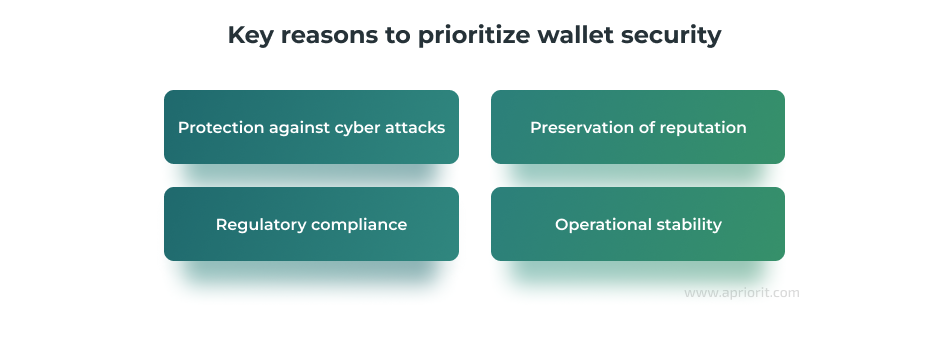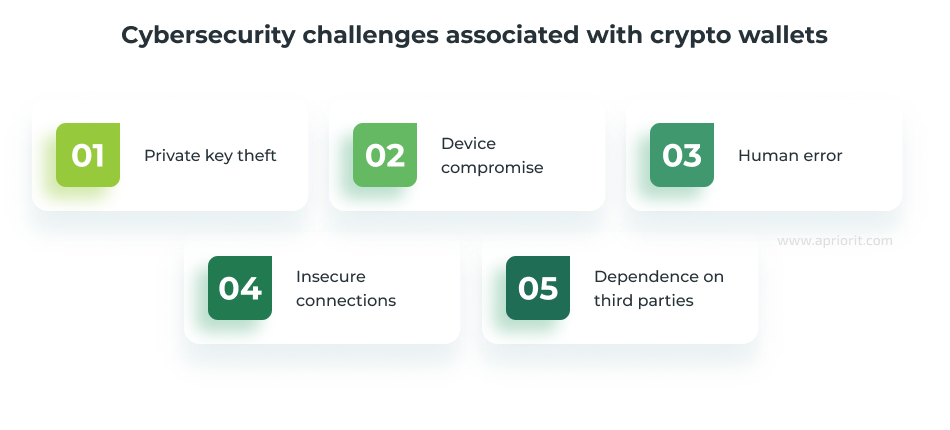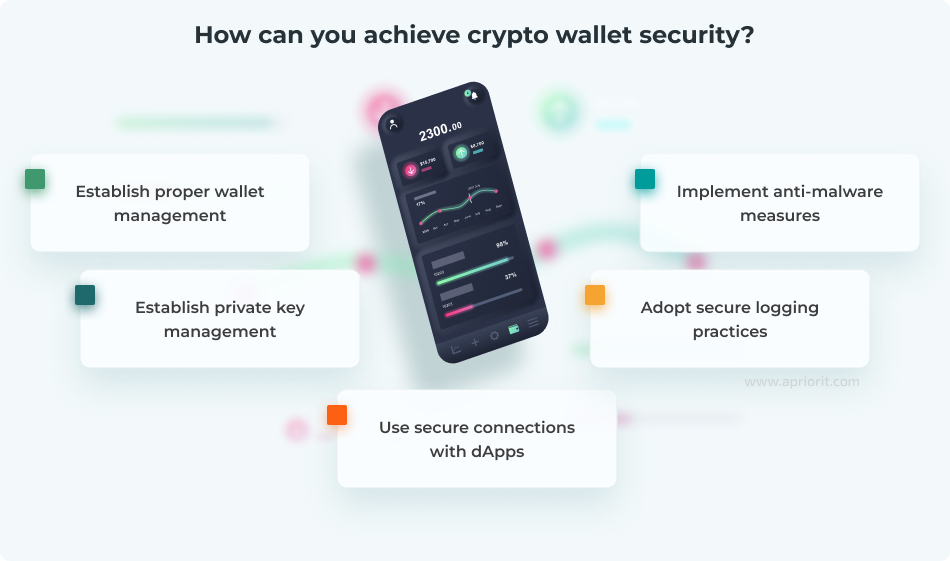Crypto wallets, which store private keys to access and manage cryptocurrencies, are frequent targets for cybercriminals. Without proper security measures, these wallets can become the victims of a range of attacks, potentially resulting in significant financial and reputational losses.
In this article, our experts explore the essentials of crypto wallet security and the key benefits and challenges associated with crypto wallets. They also offer guidance on protecting your blockchain assets and mitigating potential risks.
This article will be useful for CEOs and CTOs of cryptocurrency projects who are looking to build secure and resilient crypto wallets as well as to protect their own and their clients’ digital assets.
Understanding crypto wallet essentials
A crypto wallet is a tool that allows users to store and manage private keys, which are essential for accessing and managing cryptocurrencies. Instead of storing cryptocurrency itself, a wallet stores the private keys needed to sign blockchain transactions. These keys must be carefully protected, as anyone with access to a private key can access the corresponding cryptocurrency funds.
Crypto wallets can be broadly categorized as cold wallets or hot wallets based on their internet connectivity.
Cold wallets are more secure, as they are not connected to the internet, making them inaccessible to remote hackers. Common types of cold wallets include:
- Paper wallets, which store private keys on paper, either in a QR code or as a seed phrase. Though secure from online threats, paper wallets are prone to physical damage or loss.
- Hardware wallets, which are specialized devices designed to store private keys securely and facilitate transactions. Hardware wallets offer strong security but require careful handling.
Hot wallets are connected to the internet, making them convenient for users but susceptible to hacking. They can be further divided into:
- Cloud wallets (custodial), which store private keys on remote servers, enabling access from multiple devices. Centralized exchanges often offer cloud wallets for seamless trading.
- Local wallets (non-custodial), which store private keys on the user’s device, such as a mobile phone, desktop, or local storage. While these wallets offer more control, they come with risks if the host device is lost or compromised.
There are also multi-signature wallets that require multiple private key signatures to authorize transactions. This approach distributes keys across different devices or individuals, making it significantly harder for a single point of failure to compromise the wallet. Multi-signature wallets are particularly useful for businesses or organizations where multiple approvals are needed for financial transactions, which increases accountability and reduces fraud risks. These wallets can be combined with other wallet types, such as hardware or software wallets, to add an additional layer of security.
Another approach to wallet security is account abstraction, which allows developers to define custom on-chain security logic. This method has the potential to eliminate the need for a traditional seed phrase or private key to authorize transactions. Instead, you can use more user-friendly authentication mechanisms like passkeys or WebAuthn. This approach opens new possibilities for improving wallet usability while maintaining strong security standards.
Is your blockchain truly secure?
Protect your blockchain applications with a complete security audit. Apriorit experts will help you address vulnerabilities to ensure safety and compliance across your platform.
Why invest in crypto wallet security?
If your business deals with digital assets, investing time and effort into securing crypto wallets should be your priority. The decentralized nature of cryptocurrencies means there is no central authority to turn to for recovery in case of a security breach. This places full responsibility for protecting funds on the wallet’s security measures.
A single security lapse, such as a stolen private key or a compromised device, can result in the irreversible loss of funds. Unlike in traditional financial systems, where transactions might be reversible, blockchain transactions are immutable. One prominent example of the potentially catastrophic impact of poor security practices is the 2023 Mixin Network Hack. Mixin Network suffered a security breach wherein attackers exploited a vulnerability in the network’s smart contracts and stole around $200 million. This incident shows the risks that are related to inadequate security measures for crypto wallets, as well as the importance of security audits and timely updates.
There are several reasons why you should pay attention to wallet security:

- Protection against cyber attacks. Robust security protocols can shield your wallets from common threats like phishing, malware, and man-in-the-middle attacks.
- Preservation of reputation. A secure wallet not only protects funds but also maintains the trust of users and partners, which is very important for the long-term success of your business.
- Regulatory compliance. Implementing strong security measures will help you meet compliance requirements, which are becoming stricter and stricter when it comes to digital assets.
- Operational stability. As you boost the security of your crypto wallets, you minimize the risk of operational disruptions caused by security breaches.
As you pay more attention to the security of your crypto wallets, you must also be aware of the risks, especially in terms of security:

- Private key theft. If a hacker or malicious insider gains access to a private key, they can move funds without the owner’s knowledge or consent. This can happen as a result of phishing attacks, brute-force attacks, or device theft and can lead to significant financial losses. And unlike in traditional banking, there are no chargebacks or ways to recover stolen cryptocurrency.
- Device compromise. Whether you are using cold wallets or hot wallets, the devices on which these wallets are stored (hardware devices, mobile phones, or computers) must be adequately secured. A device that has been compromised as a result of insider threats or malware attacks can expose private keys, leading to unauthorized access to funds.
- Human error. If your employees manage crypto wallets, they might accidentally expose sensitive information by mismanaging wallets or falling for phishing attacks. To minimize this risk, educate staff on wallet security and implement strict access controls.
- Insecure connections. Communicating with dApps or blockchain networks over unsecured channels exposes wallets to man-in-the-middle attacks, where hackers intercept and potentially manipulate sensitive data or transactions.
- Dependence on third parties. Custodial wallets, to which a third party holds the private keys, might be compromised if the wallet custodian is hacked or goes bankrupt. If the wallet custodian experiences a security breach, is hacked, or faces financial insolvency, your assets could be stolen, frozen, or lost permanently, leaving you with little control over your funds.
Apart from security risks, as cryptocurrencies are subject to evolving regulations, businesses that fail to comply with legal requirements may face penalties. Your wallets need to meet local and international laws concerning anti-money laundering (AML) and know-your-customer (KYC) regulations.Every wallet type has its own security risks and additional challenges. Next, we explore crypto wallet security best practices from Apriorit experts to help you mitigate potential risks and enhance wallet protection.
Read also
Blockchain for Cybersecurity: Benefits, Challenges, and Use Cases
From decentralized storage to enhanced data protection, explore how integrating a blockchain can protect your organization against evolving threats.

Best practices for strengthening crypto wallet security
Inadequate protection of private keys, insecure connections, and device compromise can expose wallets to attacks. As you develop or manage crypto wallets, there are two main areas where issues might arise: device mismanagement and software vulnerabilities.
Here are best practices from Apriorit experts designed to mitigate these risks:

Let’s take a closer look at each of these practices.
Establish proper wallet management
Even the most secure wallet applications can be compromised by improper use or mismanagement. Users may unintentionally make security mistakes or become targets of cyberattacks. Even those experienced in crypto management can occasionally make errors that jeopardize funds. Here are some common attack vectors when it comes to device mismanagement and how to mitigate them:
- Device theft. When a device with a wallet application is stolen, all data on that device becomes accessible to the thief. However, if private keys are properly protected with encryption, they cannot be used without the correct passphrase. Also, in addition to encryption, you need to back up wallet data to make sure the wallet can be restored if the device on which it is located is lost or stolen.
- Phishing attacks. Phishing sites may ask users to enter their private keys or approve transactions that transfer funds to an attacker. To mitigate this risk, wallet applications should include warnings before displaying private keys and integrate databases of verified websites. This way, users can be alerted of untrusted sites and thus avoid malicious actors.
- Unsecure networks. Connecting to public Wi-Fi can expose users to man-in-the-middle attacks, where hackers intercept data between the wallet and the blockchain network. To prevent this, your team should always use secure connections when communicating with the blockchain and provide comprehensive transaction information to users before they sign or approve transactions.
Implement anti-malware measures
Malware can be unknowingly installed on a user’s device and pose serious threats to crypto wallets. As soon as it’s activated, malware can perform harmful actions like keylogging, clipboard hijacking, and taking screenshots. All of these actions can compromise sensitive wallet data.
To efficiently protect a wallet from malware, your development team should:
- Adhere to platform security standards. Developers should account for potential threats and configure wallet applications in line with platform-specific security standards (e.g., for iOS and Android) to reduce vulnerability to malware and enhance overall application security.
- Implement protective security features. Incorporate features such as clipboard monitoring, which can detect unauthorized changes and prevent clipboard hijacking. Other safeguards can help boost security as well, such as encryption of sensitive data in memory, session timeouts, and sandboxing techniques to isolate wallet functions from other applications.
Read also
Catching Sandbox-Evading Malware: Techniques, Principles & Solutions
Advanced malware can evade sandbox detection and steal data without raising any alarms. Explore effective techniques to recognize and mitigate these risks and enhance your security posture.

Establish private key management
The core of crypto wallet security is ensuring the safety of private keys, which are the main target of attackers. Here is a list of questions that will help your team determine and fix flaws in private key handling:
- Where is the key stored? Modern operating systems and execution environments typically provide specialized secure storage solutions designed to protect sensitive information, such as hardware security modules or secure enclaves.
- How is the key encrypted? The encryption algorithm used by your team must provide a high level of security, as private key encryption should prioritize security over efficiency. For private keys to crypto wallets, there should not be any tradeoff in favor of efficiency against security. The main encryption standards you can use are AES, RSA, ECC, and Argon2.
- How is the key accessed? A private key’s primary function is to sign transactions, so when the wallet is performing other operations, the key should remain encrypted. While keeping the private key decrypted for long periods may improve the user experience, your team should minimize this window to reduce risk.
- Is there multifactor access? Requiring multiple actions to access the private key on a device (providing an authentication code and passkey) or on the blockchain (providing multiple signatures) significantly reduces the risk of a single point of failure, making it harder for attackers to compromise the wallet.
Adopt secure logging practices
Access to sensitive information should be strictly limited. Application logs are one common source of data leaks. To secure a wallet application, it’s essential to closely manage what is recorded in logs. Here are some things to consider:
- What information does the application record? Production logs should contain only the data necessary for identifying potential bugs and avoid storing any personal or sensitive information. As your team limits your app’s logging capabilities, they reduce the risk of exposing private data.
- Are dependencies logging data? Third-party dependencies can pose logging risks, as they may capture extensive data when an error occurs. If sensitive information is shared with a function from an external library, your team needs to research and test how the library handles this data to prevent unintended exposure.
- What does the execution environment log? The wallet application itself is not the only source of logging. The execution environment, such as a browser or operating system, often records its own logs. For example, a browser may log interactions with extensions and potentially capture input data. Developers need to monitor and manage these external logs for comprehensive security.
- What information appears in monitoring? Applications often use various monitoring services to understand user behavior, preferences, or the most commonly used devices. However, sensitive information should never be included in monitoring to ensure user privacy and security.
Use secure connections with dApps
Crypto wallets are often used in combination with decentralized applications (dApps) by establishing a connection between them. In this case, it’s very important to consider security across all touchpoints:
- Adapt to different blockchain models. Developers should design a crypto wallet considering the specific blockchain models it interacts with. For example, blockchains with an account-based model, like Ethereum, handle balances differently from those with an Unspent Transaction Output model. Without careful adaptation, multichain wallets can face operational issues if they try to use the same logic modules.
- Make sure the connection is secure. The communication channel between the crypto wallet and dApp must be encrypted to protect against man-in-the-middle attacks. This way, your team will make sure that data cannot be intercepted during transmission.
- Implement manual approval for dApp actions. All requests from a dApp should require manual approval by the user. To protect funds even further, confirmed actions should not be automatically repeated or replayed without explicit user consent.
- Mitigate spam attempts. Malicious dApps can exploit initial connections to repeatedly send connection or transaction requests, potentially overwhelming the wallet and causing user errors. Your team should design wallets to detect and mitigate these spam requests.
- Provide a scam check. Collect information about known scam dApps and warn users when they interact with such applications. This proactive measure can prevent users from unknowingly engaging with malicious dApps and protect their assets.
By implementing these measures, you can enhance the security of your crypto wallets and reduce the likelihood of unauthorized access and potential attacks.
Related project
Enhancing Financial Data and Operational Security with a Tezos Wallet and dApp Audit
Explore our success story of collaboration with a US-based company. We helped them to improve the resilience of their Tezos wallet and dApp, protecting user assets and achieving reliable performance.
How can Apriorit help you secure crypto wallets?
Building a secure crypto wallet requires specialized knowledge of both blockchain technology and cybersecurity best practices. At Apriorit, we have experience providing comprehensive development and security services to help businesses build, audit, and maintain secure crypto wallet solutions.
You can always partner with Apriorit’s skilled team to implement proven security strategies, conduct smart contract audits, and develop a wallet solution that meets your business needs and regulatory requirements. Our experts can conduct two types of crypto wallet security audits:
- Black box audits simulate real-world attacks by testing your wallet’s defenses from the perspective of an external attacker with no knowledge of the internal structure.
- White box audits examine the wallet’s source code and design to uncover hidden vulnerabilities and architectural flaws that might not be visible through external testing.
Using these approaches, we provide a holistic assessment, covering both dynamic testing of the application in operation and static analysis of its codebase. As a result, we make sure that your wallet is fortified against potential threats, provide actionable insights about risk mitigation, and offer recommendations on improving the security of your software.
Apart from audits, Apriorit experts offer related development services for blockchain solutions, including crypto wallets:

- Custom wallet development. We can create a solution tailored to your specific business needs, delivering a secure and user-friendly experience.
- Smart contract integration. We can help you seamlessly integrate your wallet with the dApps and blockchain services of your choice.
- Consulting and advisory. Our experts offer in-depth guidance on blockchain strategy, wallet security, and compliance, helping you confidently navigate technical challenges and industry standards.
By partnering with Apriorit, you can protect your crypto wallets against evolving security challenges and guarantee the safety of your users’ digital assets.
Conclusion
Securing crypto wallets is a complex process that requires expertise in many fields, including blockchain, cryptography, networking, and programming-specific security. Wallets need to be designed not only with strong security in mind but also with user-friendly guidance to help prevent costly mistakes.
To make sure that your wallets remain protected, you need to work together with an experienced team to maintain a strong security posture. Apriorit’s software engineers and security specialists are ready to design, build, and audit crypto wallets to meet high security standards and protect your digital assets.
Looking to advance your blockchain strategy?
Explore Apriorit’s blockchain development services that are tailored to help you deliver secure, scalable, and efficient solutions.



